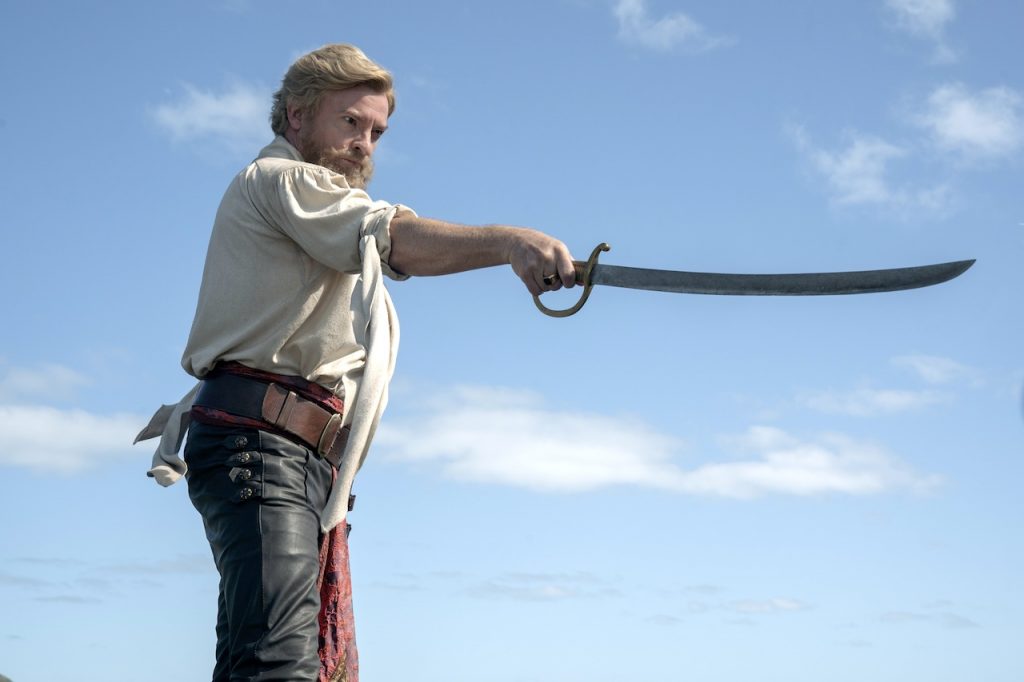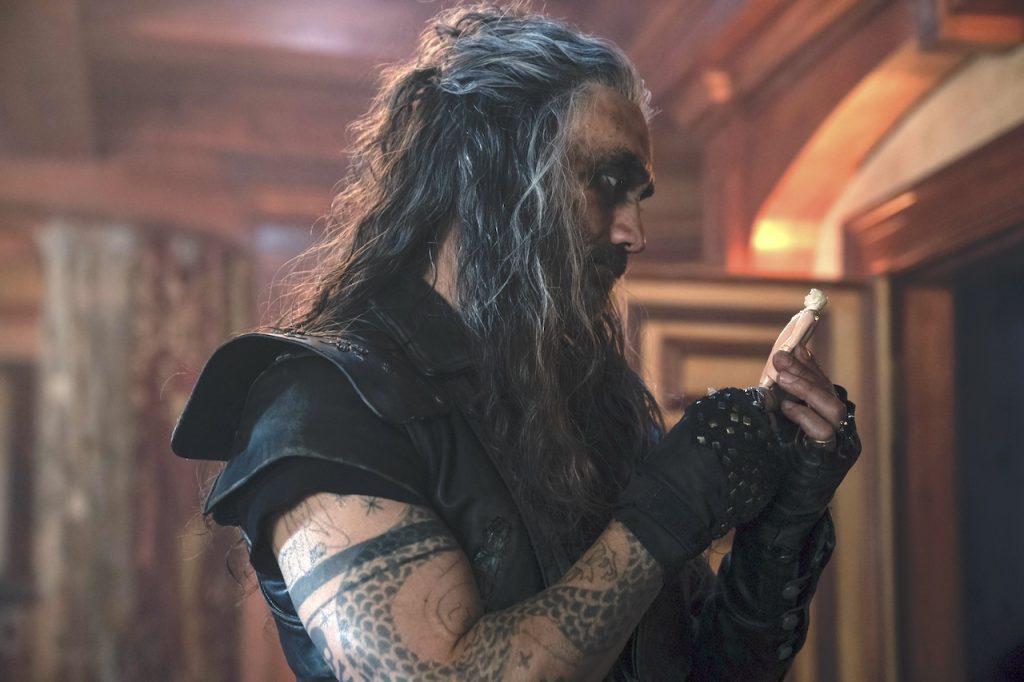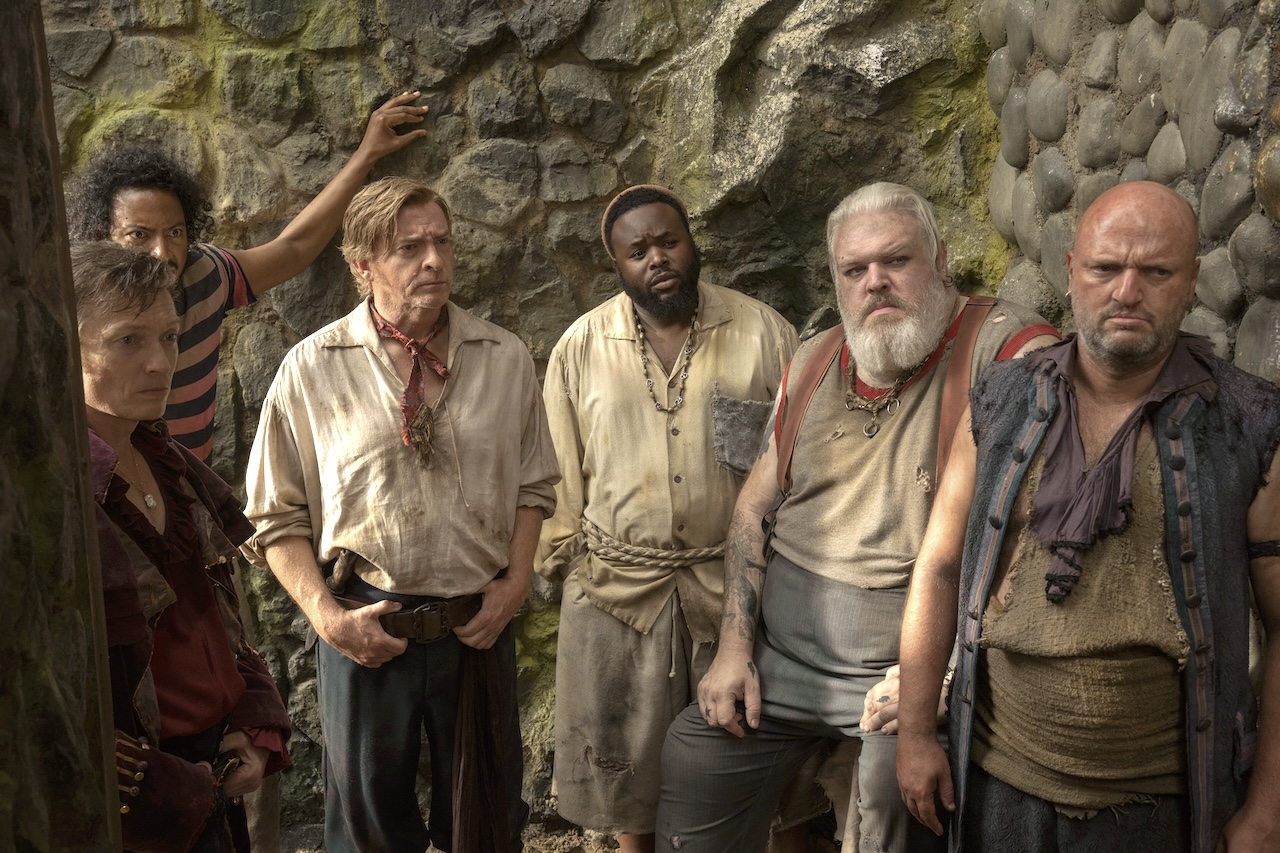Workplace romances are always tricky – especially if you’re a pirate. Arrrgh! Showrunner David Jenkins explores the ups and downs between Bluebeard and Stede “The Gentleman Pirate” Bonnet (Rhys Derby) and Blackbeard (Taika Waititi) in the second season of his eccentric Peabody®-nominated comedy Our Flag Means Death. Slightly based on a true story of an aristocrat who gave up his life of pampered privilege to become a pirate, the idea began with a chat between Jenkins and his wife. He removed his pirate hat and spoke with Creative Screenwriting Magazine about his TV show.
Jenkins proclaims that there were too many gaps in Stede Bonnet’s history for Flag to be a faithful autobiography. This opened the gates to allow his creativity to flourish with a kooky premise, zany plot lines, and endearing characters.
“The stupid imaginary character that we invented has very little to do with the actual person,” confesses Jenkins. “I feel like his deeds are always about becoming a real boy.” Stede is also tested to determine how much he really wants to become a pirate – before realizing he really wants to be in love. The first season ended with Stede’s life in turmoil, but full of possibilities. His ex-wife has found love and he seeks to find the same in Blackbeard.
“Stede’s been hurt in a very personal way. He’s never let himself open up romantically. And I think we’ve all been hurt in a relationship… or we’ve done the hurting. He’s realizing he’s weaker than he ever thought that he was. He opened himself up emotionally, he got burned. and his entire life falls apart as a result. Can he ever trust again?”
“He’s still an idiot in the second season, but he’s a little bit more credible. He’s seen some hardship and he knows he’s in love. So, he’s a little bit more of a man. At the end of the first season, he’s emotionally about fourteen, maybe fifteen,” jokes the showrunner.
Our Flag Means Death is truly a coming of age love story. “Stede is a middle-aged man, but he’s never had a functioning relationship. He just doesn’t know what love is. He leaves his wife twice, and he hurts this person that he does love in a thoughtless way.” He’s ready to face the challenges of being ready to learn how to have a committed relationship. He’s still a man child, but in a better state of maturity than he was. That’s progress.

Stede Bonnet (Rhys Darby) Photo by Nicola Dove
Despite its silliness, Our Flag Means Death has many moments of grounded seriousness about how men and women process relationships differently. Stede is coming from an arranged marriage and he’s unhappy. “He was uncomfortable in a married state. A lot of Stede is just about the general discomfort of partnership and intimacy,” proclaims Jenkins. The same-sex undertones take less of the spotlight than Stede’s not knowing how to get close to someone. “We get to see men being intimate with each other in romance, and that makes it safe. I wanted to see a show that was not a specialty queer show, but one where the two characters happen to be the same sex, and they fall in love.” And it’s messy.
How Men Relate To Each Other
David Jenkins cites Heat as an example of these “buddy” films. “Heat is a love story between Robert De Niro and Al Pacino. It ends with Al Pacino holding Robert De Niro as he dies. It’s one of the most romantic endings to a movie I can think of.” The showrunner believes Midnight Run and Butch Cassidy are similar in the way they explore male intimacy.
Jenkins is mindful of terms like “bromances” turning into romances because the emphasis becomes the queer aspect of the show as opposed to the relationships. Jenkins fuses romance, a traditionally heterosexual genre, with pirate action, a traditionally masculine one into Our Flag Means Death.
Stede and Blackbeard are both emotionally-damaged individuals so their love is always tenuous and fragile.
“Many pirate movies have been whitewashed and straightwashed and I think it takes away from why were these people are connecting in the way they are connecting on these ships? What level of intimacy and partnership are they looking for that they couldn’t have on land? That’s very much part of the seafaring story,” he continues.
Our Flag Means Death isn’t about some forbidden, clandestine relationship. The crew are Stede and Blackbeard’s family and rooting for them and their relationship. Stede and Blackbeard are both children of divorce so the crew are further invested in their happiness.
The path to love is rocky. Both Stede and Blackbeard’s path is no different. “They both complement and balance each other. Stede’s a lot heartier and emotionally healthier than Blackbeard on some level. Blackbeard’s got so much damage and trauma that he’s covering up,” continues Jenkins.

Blackbeard (Taika Wiatiti) Photo by Nicola Dove
Blackbeard has the life skills that Stede lacks. “Stede’s the emotional part of the relationship and Blackbeard keeps them alive and is able to give them some kind of structure. Stede on his own is a disaster. He has a very teenage view of love.”
Comedic Style
Our Flag Means Death rolls out with a highly-specific style of understated deadpan comedy, largely devoid of big hearty belly laughs. The chuckles come from highly specific characters. “We understand the moment-to-moment drama of them as characters. It’s just some of the things that they’re doing are a little more outlandish than in a drama, but it’s not like they’re just going for a joke. I want to see a performance that you’d see in a drama, just a little more stupid,” clarifies Jenkins. “There are emotional moments and I don’t want to see them diffused immediately with a joke.”
“If love is a little more expensive, and if the things they say are a little more painful, then it’s a good flavor for me to pair with something very stupid in another scene,” elaborates the showrunner. David Jenkins acknowledges the parallels between Our Flag Means Death and Wes Anderson’s quirky movies – “You get real pathos and then you get real stupidity side by side. That just makes my heart leap.”
The effortless nature of the gags in Our Flag Means Death have their limits despite their ostensible absurdity. Jenkins is averse to characters being mean for the sake of it. “I want to know why they’re doing it. Does the joke play to the conceit of the character or does it just flatten them?”
The writing process in the writers’ room was therefore more focused on mining the characters than telling jokes. “I think the big thing is to track the emotional arcs and where they are in the relationship. And watching where those relationships go will tell you where you want to see the rest of the season go. And so, a lot of times, the action dictates what happens in the rest of the story.”
The writing team also has a “cool bucket’ where cool ideas rest until they are inserted into the story if needed.
The relationship drives the pirate and the workplace stuff
Writers’ Room
David Jenkins has written episodes by himself and in a writers’ room. “When you write by yourself, it’s painful and awful, and you get stuck,” he laments. “And when you write in a group with a bunch of brains, the exact same thing happens.”
However, the writers’ room can collective figure out why the story stalls and how to get it back on track. “It’s like you’re working on a crossword puzzle collectively.”
David Jenkins didn’t receive too much interference from the network. They’ve been onboard with the show the whole time. “A good note that they had was they wanted to get Stede and Blackbeard back together in the first part of the season. I wouldn’t want to see an entire season where we keep them apart and only to get them back together again at the end.”
To conclude our conversation, we asked David Jenkins whether he personally relates more to Stede or Blackbeard. After prolonged consideration, he couldn’t decide. “I really like Stede because he’s like an outsider artist and he has an amateur status that he’s able to keep alive. That’s really beautiful and I think that’s why Blackbeard falls for him because he’s jaded. Stede is like Blackbeard’s Mad Pixie Dream Girl.”
